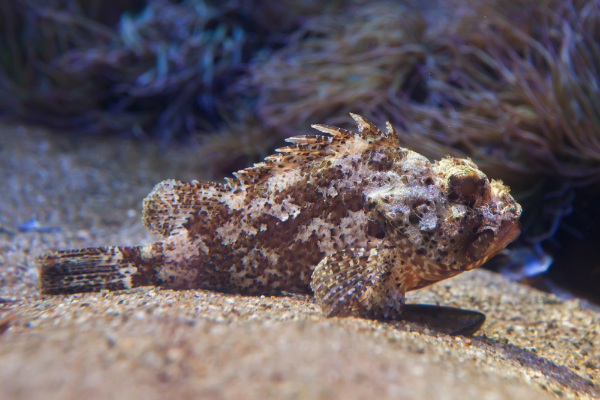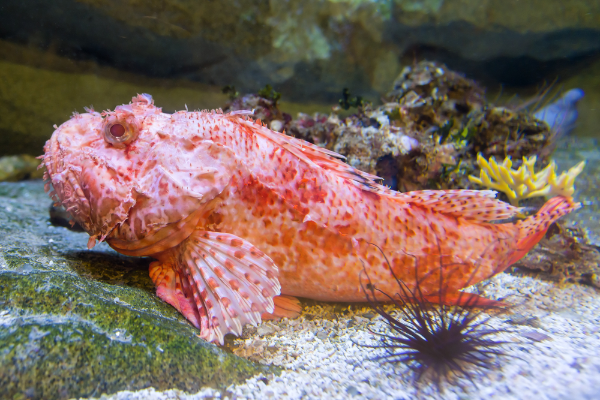If you’re heading out on a scuba diving trip, there’s a good chance you’ll spot at least one of these guys. Scorpion fish are common on both coral and rocky reefs all around the world. They can be identified by their unique appearance, and they’re definitely not something you want to mess with! Keep reading for more information about scorpion fish, including how to stay safe if you encounter one.

Scorpion Fish Description
The Scorpion Fish is a large, carnivorous fish that is found in tropical and subtropical waters around the world. Scorpion Fish are characterized by their long, flat bodies and large, Fan-like fins. Scorpion Fish are ambush predators, and they use their camouflaged appearance to blend in with their surroundings and surprise their prey. They can be found in a variety of colors, including red, orange, yellow, and brown. Their diet consists primarily of small fish and invertebrates, but they will also consume larger prey if they can catch it. Scorpion Fish are considered to be dangerous to humans due to their sharp spines, which are coated with venomous proteins. However, Scorpion Fish usually only attack humans when they feel threatened or have been provoked. If you encounter a Scorpion Fish in the wild, it is important to stay calm and avoid startling it.
Scorpion Fish Habitat
Scorpion fish, a type of ray-finned fish that are native to the Indo-Pacific region, live in a variety of habitats, from shallow coral reefs to deep-sea hydrothermal vents. They are common in tropical and subtropical waters, but can also be found in temperate waters. Scorpion fish prefer to hide among the rubble and coral of their reefs, waiting to ambush their prey. Some species of scorpion fish are also known to inhabit shipwrecks. Scorpion fish are well-camouflaged, and their venomous spines make them dangerous to humans. Although they are not aggressive, they will sting if they feel threatened. Scorpion fish are popular with hobbyists and are often kept in aquariums.
Scorpion Fish Diet
Scorpion fish are carnivorous predators that mostly eat small fish and invertebrates. Their diet also includes amphipods, crabs, squid, and smaller scorpion fish. Scorpion fish hunt by patiently stalking their prey before ambushing them with a quick lunge. They have sharp spines on their fins that can deliver a painful sting, so their prey is often reluctant to struggle. Scorpion fish are also known to be cannibals, and they have been known to eat other scorpion fish, particularly during times of food scarcity. While the Scorpion fish diet consists mostly of small animals, they are opportunistic feeders and will consume whatever prey is available.
Scorpion Fish Size
Scorpion fish are a type of marine fish that are known for their large size. Adult Scorpion fish can grow to be over 2 feet long, and they have been known to weigh up to 4 pounds. Scorpion fish are found in tropical and subtropical waters around the world, and they are a popular food fish in many cultures. In addition to their large size, Scorpion fish are also known for their venomous spines. These spines can deliver a painful sting to humans, and they can also be toxic if ingested. As a result, Scorpion fish must be handled with care. However, when cooked properly, Scorpion fish can make a delicious and nutritious meal.

Scorpion Fish Lifespan
Scorpion fish are characterized by their venomous spines, which they use to protect themselves from predators. Scorpion fish are relatively long-lived fish, with a lifespan of up to 20 years in the wild. In captivity, they can live even longer, with one individual Scorpion fish living to the age of 30 years. They are habitats in a variety of different environments, including coral reefs, lagoons, and deep-sea habitats. Scorpion fish are predators, and their diet consists of smaller fish and crustaceans.
Scorpion Fish Behavior
Scorpion fish are a type of fish that are known for their venomous spines. These spines are used for both defense and hunting. Scorpion fish typically live in tropical and subtropical waters. Scorpion fish are ambush predators. This means that they wait for their prey to come close before attacking. Scorpion fish typically feed on smaller fish and invertebrates. When hunting, they use their venomous spines to paralyze their prey. Scorpion fish are considered to be a delicacy in some cultures. However, due to their venomous spines, they must be prepared carefully before they can be eaten safely.
Scorpion Fish Speed
Scorpion Fish are one of the fastest fish in the sea. They can reach speeds of up to 60 miles per hour. Scorpion Fish use their speed to hunt for prey. They also use their speed to escape from predators. Scorpion Fish are not the only fast fish in the sea. There are many other fish that can reach high speeds. Some of these fish include: tuna, marlin, sailfish, and swordfish. Scorpion Fish are one of the fastest fish in the sea, but they are not the only fast fish. Many other fish can reach high speeds, making them a worthy adversary in the water.
Scorpion Fish Hunting
Scorpion fish hunting is a dangerous but thrilling sport. These venomous creatures are found in tropical and subtropical waters around the world, and can grow to be nearly two feet long. Scorpion fish are notoriously difficult to catch, as they are well camouflaged and blend in with their surroundings. But for those brave enough to try, the rewards can be great. Not only is Scorpion fish meat a delicacy in many cultures, but the fish’s stunning fins are also highly prized by collectors. Scorpion fish hunting is not for the faint of heart, but it can be a truly thrilling experience.
Conclusion
Scorpion Fish are a beautiful and deadly addition to any aquarium. They add an element of danger and excitement that can be hard to find in other fish. If you’re considering adding one of these creatures to your tank, be sure to do your research first. Make sure you have the proper equipment and know how to care for them properly. With a little preparation, you can enjoy the beauty and power of the scorpion fish safely and responsibly.
Frequently Asked Question

